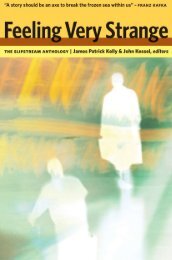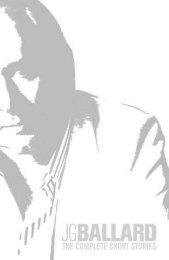The Curse of the Wer.. - Site de Thomas - Free
The Curse of the Wer.. - Site de Thomas - Free
The Curse of the Wer.. - Site de Thomas - Free
You also want an ePaper? Increase the reach of your titles
YUMPU automatically turns print PDFs into web optimized ePapers that Google loves.
120 THE CURSE OF THE WEREWOLF<br />
nature and femininity, merging feminist and ecological concerns. 16<br />
In<strong>de</strong>ed, <strong>the</strong> ecological perspectives <strong>of</strong> ‘god<strong>de</strong>ss worship’ are reflected<br />
in <strong>the</strong> repeated references to such work in <strong>the</strong> <strong>the</strong>oretical literature<br />
<strong>of</strong> ec<strong>of</strong>eminism. 17<br />
In a move that was in<strong>de</strong>bted to Jung’s <strong>the</strong>orization <strong>of</strong> <strong>the</strong> archetypal<br />
content in <strong>the</strong> collective unconscious, ‘god<strong>de</strong>ss’ literature <strong>of</strong>ten asserted<br />
that knowledge <strong>of</strong> a prehistoric, powerful femininity is somehow<br />
embed<strong>de</strong>d in <strong>the</strong> mo<strong>de</strong>rn psyche. This aspect <strong>of</strong> Jung’s work was foun<strong>de</strong>d<br />
in biology, and contrasted with <strong>the</strong> emphasis upon social environment<br />
which prevailed among his colleagues (including Freud) and which<br />
has since dominated <strong>the</strong> study <strong>of</strong> psychology. 18 Jung confirmed <strong>the</strong><br />
biological foundations <strong>of</strong> his <strong>the</strong>ory when he wrote that an archetype<br />
‘is not meant to <strong>de</strong>note an inherited i<strong>de</strong>a, but ra<strong>the</strong>r an inherited<br />
mo<strong>de</strong> <strong>of</strong> functioning … In o<strong>the</strong>r words, it is a “pattern <strong>of</strong> behaviour”.<br />
This aspect <strong>of</strong> <strong>the</strong> archetype, <strong>the</strong> purely biological one, is <strong>the</strong> proper<br />
concern <strong>of</strong> scientific psychology.’ 19 He was by no means proposing, <strong>of</strong><br />
course, that human behaviour is purely biologically <strong>de</strong>termined; on<br />
<strong>the</strong> contrary, as Anthony Stevens has explained, Jung was suggesting<br />
that ‘<strong>the</strong> essential role <strong>of</strong> personal experience was to <strong>de</strong>velop what is<br />
already <strong>the</strong>re — to actualise <strong>the</strong> archetypal potential already present<br />
in <strong>the</strong> psycho-physical organism.’ 20 In effect, Jungian <strong>the</strong>ory promised<br />
transformation through <strong>the</strong> <strong>de</strong>velopment <strong>of</strong> <strong>the</strong> archetypal substance<br />
<strong>of</strong> <strong>the</strong> personality, while still acknowledging humanity’s connectivity<br />
with <strong>the</strong> natural world — a combination that proved attractive to<br />
feminists interested in creating a reservoir <strong>of</strong> empowering feminine<br />
imagery. Certainly, because Jungian <strong>the</strong>ory embraced <strong>the</strong> biology <strong>of</strong><br />
humanity, it seemed a more positive starting point than most o<strong>the</strong>r<br />
mo<strong>de</strong>ls for exploring a femininity that has been negatively equated with<br />
nature. At <strong>the</strong> same time, it encouraged <strong>the</strong> transformative process <strong>of</strong><br />
engagement with mythical and linguistic images that <strong>de</strong>velopments in<br />
feminist <strong>the</strong>ory <strong>de</strong>man<strong>de</strong>d. 21<br />
Consequently, writers engaged in <strong>the</strong> valorization <strong>of</strong> <strong>the</strong> feminine<br />
have i<strong>de</strong>ntified and elaborated a number <strong>of</strong> archetypal images. <strong>The</strong><br />
symbol <strong>of</strong> <strong>the</strong> cycle, for example, has been particularly evi<strong>de</strong>nt in such<br />
writing, and has, like o<strong>the</strong>r imagery <strong>of</strong> femininity and nature, required





